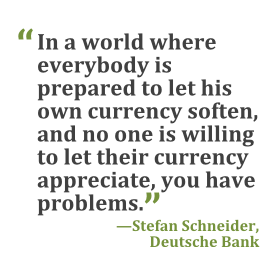As many rush to ease monetary policy even more to revive their lackluster economies, those that don't—such as the U.S. Federal Reserve and Bank of England—have found their growth penalized by rising currencies. That may contribute to a more accommodative policy path than they envisaged, reversing foreign-exchange rate gains and putting pressure on their counterparts to take further action.
This kind of vicious cycle may be one reason why investors are increasingly questioning the ability of monetary policy to spur economic growth. It marks a potential shift from what was supposed to be a year of divergence in central bank policies.
 "If growth is disappointing and countries that hit the zero bound try to export their problems through currency weakness, that sucks everyone else closer to the zero bound," said Michael Feroli, chief U.S. economist at JPMorgan Chase & Co. in New York. "You have a contagion."
"If growth is disappointing and countries that hit the zero bound try to export their problems through currency weakness, that sucks everyone else closer to the zero bound," said Michael Feroli, chief U.S. economist at JPMorgan Chase & Co. in New York. "You have a contagion."
Complete your profile to continue reading and get FREE access to Treasury & Risk, part of your ALM digital membership.
Your access to unlimited Treasury & Risk content isn’t changing.
Once you are an ALM digital member, you’ll receive:
- Thought leadership on regulatory changes, economic trends, corporate success stories, and tactical solutions for treasurers, CFOs, risk managers, controllers, and other finance professionals
- Informative weekly newsletter featuring news, analysis, real-world case studies, and other critical content
- Educational webcasts, white papers, and ebooks from industry thought leaders
- Critical coverage of the employee benefits and financial advisory markets on our other ALM sites, PropertyCasualty360 and ThinkAdvisor
Already have an account? Sign In Now
*May exclude premium content© 2025 ALM Global, LLC, All Rights Reserved. Request academic re-use from www.copyright.com. All other uses, submit a request to [email protected]. For more information visit Asset & Logo Licensing.





